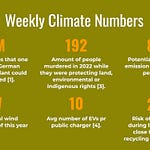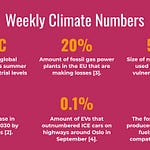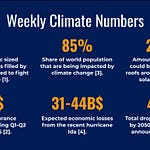Welcome to this weeks edition of The Weekly Climate 🎉
References: [1], [2], [3] and [4].
‼️News you can’t miss
Here’s one important scary/bad (🙀), good (😻), interesting (😼) and fossil (💩) news item.
🙀 Did you know that supermarkets (in the US alone) emit 2.6Gt of CO2eq into the atmosphere due to F-gas emissions?
😻 Mining giants are saying goodbye to coal. Hopefully for good.
😼 CarbonBrief goes deep into what health benefits we can expect if we decide to solve the climate crisis.
💩 Texas suffered a lot of blackouts from the recent extreme cold caused by the polar vortex. The cause: Mainly fossil gas outages, but also other sources.
👩⚕️ Status: Climate & Science
Let’s look at how we’re doing this week!
[#methanecrater] — If you wanna see a 3D rendering of one of those scary Siberia “methane craters” then look no further. They’re huuugge..
📰 The 7 Grand Challenges
⚡️Decarbonize Electricity
Clean electricity is the one do-or-die challenge we must solve.
[#renewables] — Across the world, but certainly in the US renewable energy has had a record setting year, despite the pandemic. Not only is renewable making a large land grab in terms of total generation (up 11% from 2019), but capacity is also up from previous years (33.6GW added).
[#us] — You may be surprised to know (I certainly was) that according a new report by Bloomberg NEF, the US is on track to meet Paris climate goals. I must admit that I was so stunned by this that I almost didn’t publish it. I didn’t have time to go through the report in great detail but if any reader has that please post any comments below. I for sure will study this one.
[#utilization] — A study has found that energy storage in operation in the U.S. (such as pumped hydro and utility scale batteries) utilize about 80% of the electricity they store, i.e. if a battery charge to 100% it returns 80% of the electricity back to grid at some point. The remaining 20% is lost.. Due to various inefficiencies it will probably be impossible to ever reach 100%. Long duration storage technologies hope to increase this utilization rate further.
🏘 Reduce impact of urban and rural areas
Lowering the impact of urban and rural areas.
[#australia] — There’s a big risk that Australia will be left behind other countries when it comes to transforming their vehicle fleet to EVs. Australia is lacking any political will or incentives for consumers to make the switch, as is present in many other developed countries. And this is clear seen in the numbers in EU, EV sales rose from 3% to 10% last year. And for Australia... 0.6% to 0.75%. Since Australia is one of the countries in the world with the highest rooftop solar penetration, one would think that EVs were a no-brainer: Hey, who wouldn’t wanna drive for sfree, right? But even with this obvious advantage it just goes to show that political intervention unfortunately, is needed in a lot of areas to get consumers to make the right decisions.
[#batteries] — New York Times dives into the race among carmakers and investors to drive the car industry’s future with batteries. It looks at interesting startup companies and trends in the space such as many big automakers commitments to EVs.
[#fireplace] — We (my household) bought a house last week! 😲 Wish us luck — it can still fail 🤞. During the hunt these past months I was quite surprised to see how many houses here in the Zealand part of Denmark that we looked at which still had a fireplace. In an electrified world and especially with a high penetration of renewables as we have in Denmark it just makes no sense to still have a fireplace (it’s “hyggeligt” I know I know). And now this study in the UK has shown that wood burning in the home is the biggest contributor to UK particle pollution so surely something must be done.
🛁 Clean non-electrifiable activities
Some activities we do today can’t be electrified, these must be cleaned some other way.
[#supermarkets] — A new report by “Climate Friendly Supermarkets” calculates that supermarkets in the US are in fact big polluters because their fridges emits the extremely potent greenhouse gas HFC. In fact the 38.000 supermarkets in the US emits as much as 2.6Gt of CO2eq. Each supermarket emits as much HFCs as to cover the emissions of 300 cars. Also this recent excellent “🎧 How to save a planet” episode goes into detail about the F-gas problem AND the issue with supermarkets.
🌳 Protect and grow nature
Nature is our ally, we must protect it and help it help us.
[#grazing] — An interesting deep dive into how farms and farm animals can help increase the soils uptake of carbon. Although the article also raises some challenges and disputes about the exact effectiveness of these practices.
[#trees] — All tree planting organisations today have planted a total of 63 million trees, according to the 1 trillion trees campaign. So we need to plant 16.000x more than we have already planted. That puts the tree challenge into perspective. This nerdy tree article by Cleantechnica dives deep into trees and how to think about this challenge.
🍽 Optimize food
Without the lower impact of food or drink the hero doesn’t work (modified old danish proverb).
[#gmo] — I missed this one last week, but I think it’s pretty important so I decided to push it this week. It’s about EUs stance on GMO which can be pretty much summed up by the word “no”. A study now reveals that this “no” has caused millions of tonnes additional CO2 emissions: An estimated 33 million tonnes. Reason is farmers in EU has lower yields (and thus lower carbon sequestration) than countries that use GMO.
[#rivers] — River Action is launching its first campaign to make the world aware of the harmful impact that free range chicken farms are having on river ecosystems in the UK.
[#seafood] — Artificial red meat replacements are getting a lot of attention, but what about alternatives to seafood? This Grist article attempts to find out! Overall the author is impressed with all products she tried except one tuna product.
⚖️ Climate Justice
Without justice there’s no future.
[#india] — India is facing mounting diplomatic pressure for setting a net zero target, which the country has still to do. Insiders report that there’s a lot of talk about net zero, but that its still lacking from any political planning. India is in the top-10 of the most polluting countries, but with a fast rising middle class in India that number is expected to grow a lot in the coming years.
[#india] — And more from India. In case you didn’t know: 100.000s of farmers have been protesting in India since November. The reason is new regulation by the government that creates environment for big industry farmers, and worsens it for the smaller farmers. According to this article this is the opposite of what India should be doing. They should instead focus on supporting the farmers and help them adapt to climate change.
📦 Other / catch-all
All the other stuff that I couldn’t fit into any of the other categories, than the other category.
[#health] — One of the biggest opportunities for solving the climate crisis is the improved health benefits that just about everyone on the planet Earth will benefit from. This article by CarbonBrief goes deep into these and what we can expect.
[#book] — Last week we wrote about Bill Gates new book and there’s some interesting interviews with him about that. This one in particular, where he also discusses all the pushback he’s getting about his climate solutions. In another one, Bill McKibben (founder of 350), reviews his book. And he’s not hostile, but not impressed either. As McKibben points out, Gates’ seems to have missed the rapid increase in solar and wind power efficiency. Leah Stokes also review Bill’s book together with Kim Stanley-Robinsons latest climate novel and Elizabeth Kolberts book on geoengineering. Both reviews are highly worth a read and together with Michael Manns “The New Climate War” probably constitutes the most important climate books anyone can read right now.
[#psychology] — Here’s an interesting article about how the communication about climate change affects us. There’s this long lasting debate on whether we need to scare people into action or inspire them into action. And every time there’s a big news piece out taking either side the debate spurs to life again. Grist tries here to get to the bottom of it.
⭐️Special Topics
🎩 Global and local policy
We have a special interest in covering the major global and local policies regarding climate, whether good or bad.
[#oecd] — At almost his dieing breath as Secretary General of OECD, Angel Gurria, made it clear that the world must put a big fat price on carbon. This is important because as his successor is taking over on March 1 he’s faced with a choice of continuing Angel’s climate work or going back (as many politicians would love) to just track metrics like GDP.
[#biodiversity] — A new report by UNEP ties all action towards improving biodiversity, reducing pollution and solving the climate crisis together. The report highlights that we need to stop waging war on nature and instead implement the value that it provides into our policies and economic planning. Instead of just taking it for granted as we do now.
[#mexico] — It’s really sad to see Mexico going from being in a climate leadership role to betting the farm on fossil fuels. The country was the first to submit it’s ambitious climate plan ahead of the Paris agreement, but now it pretty much ignores said climate plan and instead focus on fossil fuels. This article goes into details about the transition.
⛽️Major Carbon Emitters
We have a special interest in covering the moving of the major carbon emitters as these are the key roadblock to climate action.
[#texas] — You know what they say: Everything is bigger in Texas. Probably the most important topic of this week is last weeks situation in Texas. So we’re going a bit long on this one. The polar vortex caused temperatures to drop to -10C and this causes huge and long lasting power outages across the state. Getting a dejavu? Yes the exact same thing happened in California, only the cause was the opposite, extreme heat. Similar to California, a key problem in this case was that this time fossil gas plants doesn’t like cold weather either (and no, there were no freezing wind turbines 🙄 and those that did say that was deep, DEEP in fossil fuel pockets). The key problem according to this article was the extreme weather coupled with the energy transition. No it wasn’t solely fossil fuels fault (although probably mostly fossil gas) nor was it solely clean energy’s faults (wind only account for 7% of Texas capacity). No current grid whether run entirely on coal would have been able to withstand the pressure that happened to Texas this week. The fossil fuel industry however, have been accused of demanding ridiculous prices for power for those that still had it during the storm. 5000$ for 3 days worth of power? 😳 Finally, this article in New York Times ties the California and Texas blackouts together.
[#hypocrisy] — Norway, Canada and UK are all to some degree climate frontrunners. We just saw the recent EV report yielding great numbers for Norway who also happen to get most of their electricity from renewables. Yet they export tremendous amounts of oil. According to this article that makes them pretty big climate hypocrites.
[#rich] — It’s wellknown that the world’s richest pollutes a lot more than the rest of us. How much you may ask and where does all this pollution comes from? Well. A Boeing 747 emits 6500 tons of CO2 every year. A “regular” super yacht emits just above that. But Roman Abramovich’s super yacht “Eclipse” (more like super ferry) emits 25.100 tons of CO2 every year. it turns out that most of the super-rich emissions comes from transportation and in particular yachts.
[#propaganda] — Fossil gas companies are hard at work pushing lies in New Jersey where a new climate plan threatens their livelihood. So what do you do? You launch a giant campaign trying to make it clear to the public that clean energy is unaffordable.
[#coal] — Mining giants are feeling the coal getting colder. Mining giant BHP just announced 1.6B$ in stranded assets. BHP is Australia’s most valuable company, and they’re not really struggling as they reported a 6B$ in profits for 6 months (they also mine iron and copper). Similar is true for Whitehaven Coal and Glencore who are also reporting big stranded assets.
[#wallstreet] — Wall Street kicks the can down the road regarding divestment. Executives at BlackRock and Bank of America refuses to continue divestment. Actually, they will do the opposite: Continue to financially support the fossil fuel industry and hereby leaves it to Biden and “market forces” to solve the climate crisis. This really sucks...
That’s it for this week folks! Remember if you’re feeling down, angry or sad from some of the news in this newsletter one cure is to act. And one way you can always act that also happens to be one of the most powerful things you can do is to talk about it. That also works if what you just read made you hopeful or happy btw.
If you enjoyed this newsletter don’t forget to share it with your friends, coworkers or other people you think could benefit from getting it. If you got directed here by a friend or another link on the Internet don’t forget to subscribe!
See you all next week 👋















Share this post